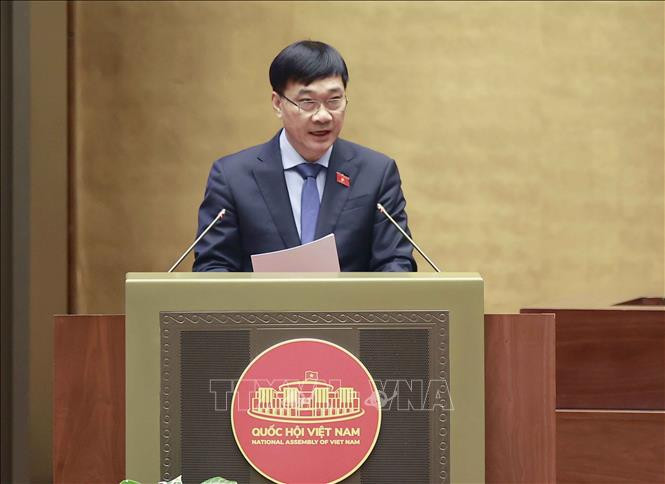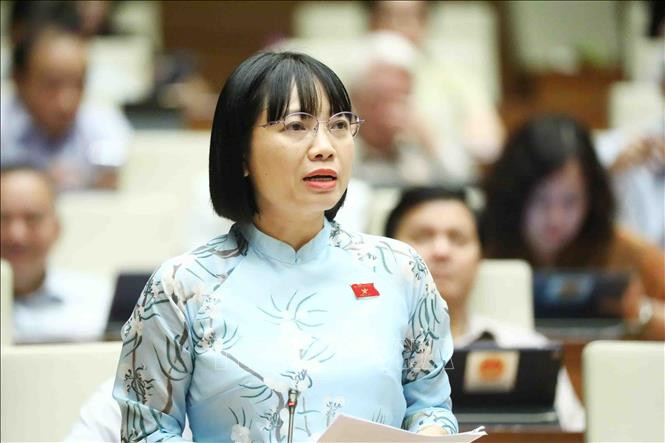On the morning of October 31, continuing the program of the 6th Session of the 15th National Assembly, the National Assembly discussed in the hall a number of contents with different opinions of the draft Law on Real Estate Business (amended).
Proposing two options with the principles of housing business and future construction projects

The report on explanation, acceptance and revision of the draft Law on Real Estate Business (amended) presented by Chairman of the Economic Committee of the National Assembly Vu Hong Thanh stated that, regarding the scope of regulation, the Standing Committee of the National Assembly has added Clause 2, Article 1 on cases where the Law on Real Estate Business does not apply, in which point d stipulates the case of "Organizations and individuals selling, leasing, leasing-purchasing houses and construction works under their legal ownership, transferring, leasing, subleasing the right to use land under their legal use for non-business purposes" because these are civil transactions, not real estate business activities in the List of conditional investment and business sectors and occupations under the Investment Law.
Regarding the conditions for houses and existing construction works put into business, the Chairman of the National Assembly's Economic Committee said that the National Assembly Standing Committee accepted and adjusted the provisions at Point e, Clause 3, Article 14. Accordingly, the sale and lease-purchase of construction floor areas only applies to construction works on land leased by the State in the form of one-time land rent payment for the entire lease term, to ensure consistency of regulations on land users' rights corresponding to the forms of land use as prescribed by the law on land.
Regarding the content of the principles of housing business and future construction works, based on the opinions of the Government, National Assembly deputies at the 5th Session, National Assembly delegations, National Assembly agencies, the National Assembly Standing Committee proposed two options.
Accordingly, the first option: "Real estate project investors are only allowed to collect deposits from customers when the houses and construction works have met all the conditions for putting into business and have conducted transactions in accordance with the provisions of this Law".
Second option: "Real estate project investors may only collect deposits according to agreements with customers when the project has a basic design appraised by a state agency and the investor has one of the documents on land use rights specified in Clause 2, Article 24 of this Law. The deposit agreement must clearly state the selling price or lease-purchase price of the house or construction work. The maximum deposit amount is according to Government regulations but must not exceed 10% of the selling price or lease-purchase price of the house or construction work, ensuring compliance with socio-economic development conditions in each period and each type of real estate."
Create conditions for businesses and investors to develop

Regarding the above content, many delegates expressed their agreement with the second option. According to delegate Nguyen Thi Viet Nga (Hai Duong), this option allows real estate project investors to collect deposits only according to other agreements when the project has a basic design and is appraised by a state agency and the investor has one of the documents on land use rights. "This option will create more favorable conditions for businesses and investors to develop compared to option one. Especially in the context of the current difficult situation of real estate businesses", the delegate emphasized.
Delegate Pham Van Hoa (Dong Thap) agreed with the second option. Explaining his choice, the delegate said: Current reality shows that this option is very popular with investors and agreed by customers. Investors often do not have 100% of the capital and must borrow from banks to form the project. Therefore, this option will contribute to creating trust between investors and customers.
Expressing agreement with many contents in the Report on explanation, acceptance and revision of the draft Law, delegate Nguyen Ngoc Son (Hai Duong) said that it is necessary to continue reviewing the provisions on interpretation of the draft Law's terms. Specifically, Clause 7, Article 3 of the draft Law stipulates that the transfer of all or part of a real estate project is the transfer by the investor of all or part of the real estate project and the rights, obligations, responsibilities and legitimate interests of the investor and related parties (if any) to the project, the transferred part of the real estate project to the transferee through a contract in accordance with the provisions of this Law.
According to delegate Nguyen Ngoc Son, current reality shows that there are many different understandings of the content of transferring all or part of a real estate project, even investigation, inspection and examination agencies are confused when handling projects with changes in investors through forms such as: transferring land use rights and assets attached to land; selling assets attached to land according to the provisions of the Land Law; buying and selling shares and capital contributions in enterprises; separating and merging enterprises.
Therefore, the delegate of Hai Duong province proposed that the regulations on this concept should clearly state the method of asset transfer to avoid taking advantage of project transfer in the above forms, leading to a situation where there is no basis to conclude that the Investor is transferring all or part of the real estate project.
Do not overlap with related bills
Giving his opinion at the meeting, delegate Nguyen Van Canh (Binh Dinh) said that currently, the National Assembly is discussing to pass three draft laws: the Land Law (amended), the Housing Law (amended), the Real Estate Business Law (amended), all of which have general regulations on real estate projects that must build new houses to be transferred. At the previous meeting, the delegate found that this regulation in the three laws was not consistent. Therefore, delegate Nguyen Van Canh proposed to only regulate this content in one law, avoiding the case where it cannot be amended independently in one law when necessary. In addition, to increase consistency and avoid overlap, the delegate said that the content of the regulation on allowing the construction of houses for business should only be regulated in the Housing Law or the Real Estate Business Law, other laws that are still applicable will be referenced.
Assessing that the draft Law on Real Estate Business has been relatively complete and seriously absorbed the opinions of National Assembly deputies, delegate Tran Khanh Thu (Thai Binh) said that, regarding the management of real estate trading floors, the draft law has basically fully institutionalized the Party's policies and guidelines on real estate market management.
However, according to the delegate, some important and complicated contents of the draft Law directly affect the people, businesses, and the national macro-economy, and are related to many draft laws that are being considered and commented on by the National Assembly. To avoid overlap, the delegate suggested that the drafting agency and the reviewing agency continue to carefully and cautiously review to clearly and strictly regulate the regulations on real estate business associated with land use planning, ensuring consistency and unity in the legal system, so that the draft Law on Real Estate Business (amended) is consistent with the draft Law on Land (amended) and the Law on Housing (amended).
According to Tin Tuc newspaper